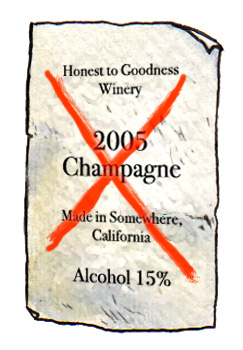 This is a very interesting question. It was actually the topic of a conversation I had with a friend of mine during a dinner. I was saying that I had problems to find in a US retailer some Champagne coming from our lovely region of Champagne.
This is a very interesting question. It was actually the topic of a conversation I had with a friend of mine during a dinner. I was saying that I had problems to find in a US retailer some Champagne coming from our lovely region of Champagne.Indeed, in France we have what we called "appelation d'origine controlee". If a product is labelled Champagne in France, that means that it has been produced and harvested in the Champagne region.
Champagne = Sparkling wine
The fact is that for most of American who don't know about this region and the history of sparkling wine, a Champagne is a sparkling wine. So for my friend there is no problem to call a Californian sparkling wine Champagne.
But however while we talk about wine or any kind of other traditional products, the region where it has been produced influence a lot both the quality and the features of a product.
Why a Champagne wine is different from another sparkling wine?
Because the Champagne region, as any other region, has some ground specificities, a climate, a know how and tradition that gives a specific quality to the wine, that you won't be able to find in California.
Because of all these features, that differentiate Champagne from any other sort of sparkling wine, the certification can be considered as a sort of brand. Maybe not an homogeneous brand of course, because the quality of wine vary a lot depending on the producer, which does not use the same technique to produce. But still a brand with an image linked to the region it has been produced in.
Champagne does not always mean better quality
This is the same concept for a Bordeaux, or a Bourgogne. I don't say that a Bordeaux is better than a Californian wine (even though my chauvinism force me to say it ;), because that would not be true.
California, Chile or South Africa produce great wines, that are highly competitive and have great qualities. Some of them beat French wines to be objective.
But Bordeaux will still be a reference as one of the best area to produce wine. Bordeaux (or Champagne) has as I have said a climate and geological conditions that can't be find anywhere. This is the same for its experienced wineries. All of that gives to Bordeaux specificities that is acknowledged by experts. Somehow you can even speak about a brand, as it has some characteristic, geographic and qualitative, that differentiate it from other products.
For example, that would shock me to see in a retail a bottle of soda written Coca Cola on it, if it is not produced by Coca Cola. That is not because it is the same ingredient that it is the same thing. Thus, American companies are fooling American customers playing on their lack of knowledge on the product. And this is bad. Bad for the French producers, but bad for a customer that will never have the chance to understand and learn about wine. I actually found this blog entry about the same topic: "Consumers clearly demand and deserve truthful wine labels which correctly identify location no matter what country they come from. Without addressing this issue, Wine Accords will fall substantially short of protecting consumer interests."
That is why I think that a Champagne should be called Champagne only if produced in the region of Champagne, France.
What do you think about it? Are you agree with me? Do you think Champagne = sparkling wine?
Blogged with the Flock Browser
Of course I agree with you. (Mind you it was the Americans who helped certain French vineyards after the War)
ReplyDeleteThank you Jeremy. I know also this story that Americans helped French vineyards.
ReplyDeleteI don't want to denigrate American wines quality, but I think it is also bad for American wines' branding to compare themselves with Bordeaux. Bordeaux and Champagne have specificities, so does American wines. Let's develop American branding! And yes I do love American wine, as I like South Africans' or Australian's
Do you think Champagne is to sparkling wine like Xerox was to copies, or Kleenex to tissues?
ReplyDeleteI think Steve this is a little bit more complicated. In a way yes: Champagne has been the first producer of sparkling wine, and establish a strong notoriety. I admit that some customers says I want a cup of champagne as they would say I have an Ipod if they own a Zune.
ReplyDeleteBut Xerox and Kleenex are corporate brands, and that is why the concept of Champagne as a brand is quite different. You can have bad sparkling wine from Champagne. However, because of its origin, you are more likely to find a good wine there than in other part of the world. Because Champagne is not a corporate brand, it is hard to protect.
Also the other problem is a customer can say I would like to have some Wall Mart Kleenex or a color Xerox, that is fine. The brand is so strong that for the customer every photocopier is a Xerox. But the problem is using the label "Champagne" on a wine not produced in Champagne. This would be the same if Microsoft would use the Apple logo to to sell its Zunes (which is not likely to happen though).